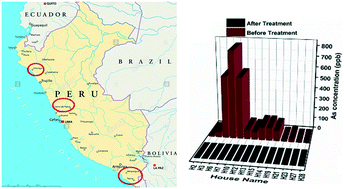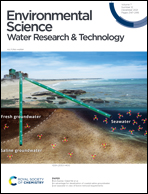Arsenic removal from Peruvian drinking water using milk protein nanofibril–carbon filters: a field study†
Abstract
The tap water quality in Peru fails to meet the World Health Organization (WHO) drinking water standards; consequently, the local population in Peru has been exposed over the last few years to harmful arsenic levels through water consumption. A field study was conducted in Peru between 2019 and 2020 using granular adsorbers and hybrid membranes based on the technology using milk protein nanofibril–carbon hybrid materials previously introduced in the literature by us (S. Bolisetty and R. Mezzenga, Nat. Nanotechnol., 2016, 11, 365). The performance was analyzed across 28 households as well as 3 community-based water treatment plants in some of the Peruvian arsenic burdened regions, covering a range of groundwater arsenic concentrations between 11 μg L−1 and 1.1 mg L−1. Three different kinds of filtration units were installed including the combined granular media and hybrid membrane (type I), hybrid membrane alone (type II), and granular media (type III), to determine the effectiveness of different filtration setups for arsenic removal in different regions. The arsenic removal by household filtration units and community filtration units shows a removal efficiency exceeding 99% at various initial arsenic concentrations for a duration up to nine months. In addition, it is shown that an aqueous NaOH solution can be used to regenerate the adsorbent, extending its operational lifetime and the overall capacity for As removal. High purification efficiency, very low cost, safety, little to no energy requirement, possibility of regeneration and simplicity of operation make this technology suitable for arsenic removal from drinking water in a broad range of urban and rural areas.

- This article is part of the themed collections: Recent Open Access Articles and Urgent communications in RSC Environmental Science journals


 Please wait while we load your content...
Please wait while we load your content...